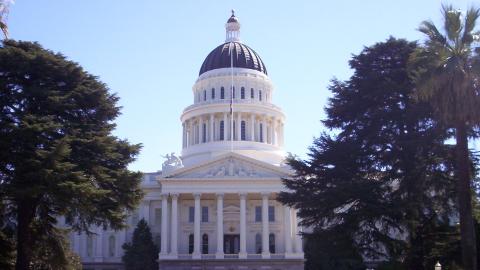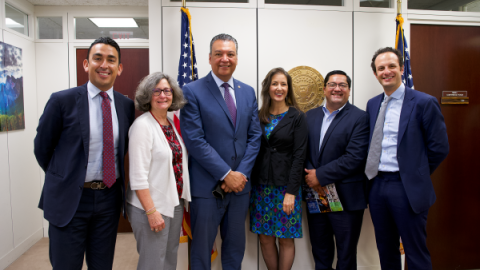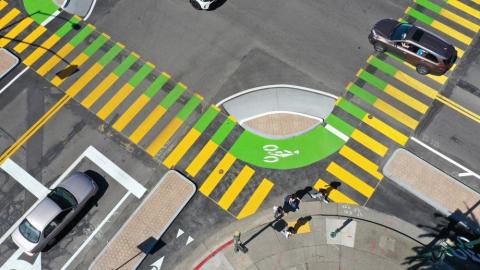
The 2022-23 state budget agreement announced Sunday by Gov. Newsom, state Senate President Pro Tem Toni Atkins and Assembly Speaker Anthony Rendon includes billions of new dollars to improve California's transportation network and address chronic housing affordability challenges.
Among the biggest commitments is a $10.8 billion transportation package that includes funds for public transit, port facilities, bicycle and pedestrian projects, rail and roadway grade separations, and transportation-related climate adaptation — on top of a separate $4.2 billion allocation to advance the ongoing California High-Speed Rail project. The final budget bills also include more than $2.7 billion to help produce, preserve and protect affordable housing.
”MTC commends Governor Newsom and state Senate and Assembly leaders, including Sen. Nancy Skinner from the East Bay and Assembly member Phil Ting of San Francisco, for reaching a timely state budget deal that includes smart decisions about meeting the state’s most urgent needs," said Commission Chair and Napa County Supervisor Alfredo Pedroza. "We’re especially encouraged about the commitment shown to affordable housing and to transportation, from high-speed rail to port facilities to public transit to bicycle and pedestrian improvements. There will be a lot of competition for state dollars, but we’re confident Bay Area projects will compare favorably with those from anywhere else in California.”
While the new budget reserves $1.8 billion from a $3.6 billion supplement to the Transit and Intercity Rail Capital Program (TIRCP) for investment in Southern California plus another $300 million likely destined for a rail realignment project in San Diego County, sponsors of Bay Area projects will be able to compete with those from other counties outside Southern California for the remaining $1.5 billion.
At least $900 million of this $1.5 billion is reserved for multi-year grants to support the delivery of capital projects that already have received TIRCP grants and can demonstrate that additional state grants will help secure local or federal dollars. Bay Area rail projects already on the federal funding train include the BART extension from Berryessa/North San Jose through downtown San Jose to Santa Clara; the ongoing electrification of the Caltrain corridor; and BART's Transbay Core Capacity improvements between the East Bay and San Francisco. Other candidates for TIRCP dollars may include extension of the Caltrain corridor to the Salesforce Transit Center in downtown San Francisco and the proposed Valley Link rail connection between the Dublin/Pleasanton BART station and the Central Valley.
The new budget provides $1.2 billion for a new Port Infrastructure Program, with half the funds available in fiscal 2022-23 and the other half in 2023-24. Eligible projects include port electrification, freight movement capacity improvements along rail corridors, and high-prioriity road/rail grade separations. Grade separation projects in other areas will be able to compete for another $350 million identified in the new state budget.
Among the additional housing investments in the new budget agreement are $500 million for a new home ownership program known as California Dream for All geared toward first-time homebuyers; $425 million over two years for the Infill Infrastructure Grant program; $410 million over two years for the adaptive re-use of existing properties; $350 million over two years for the CalHOME program that provides grants to public agencies and nonprofit organizations for assistance to first-time homebuyers and for rehabilitation assistance; $325 million over two years for the Multifamily Housing Program; $250 million for the Housing Accelerator Program; $50 million to help finance the construction of more accessory dwelling units (ADUs); $150 million over two years for the preservation of existing affordable housing; $100 million over two years for the development of affordable housing on surplus state land; and $250 million in fiscal 2023-24 for the seismic retrofit of existing affordable housing complexes.



Submit your comment
In order to receive a reply to your comment, please provide an email address.